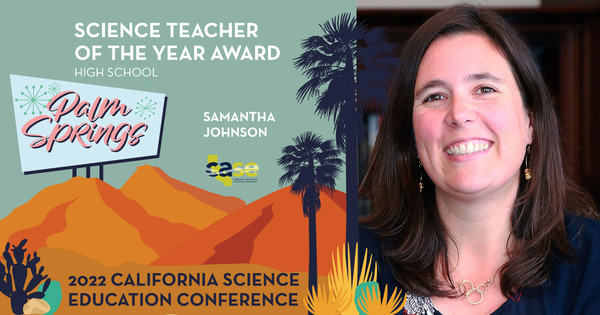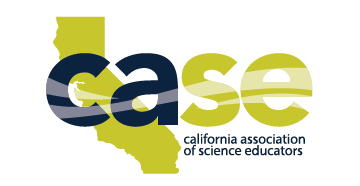
Teacher of the Year Award (High School): Samantha Johnson
Samantha Johnson
What made you decide to become a teacher?
I started teaching at a summer program called Summerbridge in San Francisco when I was in high school. The program encouraged urban middle school students to take enrichment classes taught by high school and college students. That was when I really fell in love with the job, but didn't consider it as a career choice until I was in college. When I was given the opportunity to work in classrooms in San Diego (where I did my undergrad) I realized that was what I wanted to do with my life. There were also huge influences when I was in school, both positive and negative. I had a middle school science teacher who was very intimidating...I remember her telling one student who had asked a lot of questions that he had hit his max and was no longer allowed to ask anything. I also had an AP Biology teacher in high school (Philip Blair) who was amazing; had no hesitation sharing his passion for both science and biology with us.
Additionally, I had a really great relationship with my geometry teacher in high school (John Hayden); he was the most empathetic and compassionate teacher I had throughout my secondary experience, and he taught me a lot about what it means to care about your students. Those three stand out as being really influential. I went into middle school science originally because I knew how impactful a good (or bad) teacher could be in those years. When I switched to high school, I remembered how important both passion and compassion were for me as a student and tried to emulate both of those teachers.
Why are you passionate about science education?
The students are the biggest reason I'm passionate. Watching a student make sense of an idea they're grappling with, or learning how to work and collaborate with their peers, or voicing their opinion in an informed way...I don't think you can get better than that. With 180 students a day, I get a lot of those incredibly rewarding opportunities; it's hard not to be passionate when you can see how much progress students can make.
I also think high school science has the capacity to change the world. So many students come into high school already thinking they are "bad" at science or that "they aren't science people," and shifting those preconceptions is really important to me. I think all students are capable of learning science, and in order for them to understand their world and the changes in it, I don't know that there is anything that trumps a good understanding of scientific concepts.
Since the adoption of NGSS, students are so enthusiastic about doing science. That also makes me passionate; that my traditionally under-represented students can actually see themselves in this field, feel successful and capable in something they haven't had access to. I love seeing and facilitating those shifts; it can be really life-changing for a student, and I don't know that there is anything better than that.

What are some of the most rewarding and challenging aspects of teaching?
Can I say the students for both of these?! Whenever you're working with humans, they are both rewarding and challenging. Watching students make sense of ideas they've never considered, or explaining something to someone else, or even recognizing how far they've come in their own understanding, is by far the most rewarding part of the job. Finding out years later that some students have gone into science fields because of what they experienced in my class is just the cherry on top; even the students who don't go into science have those moments in class that make you realize how much of a difference you're making in their learning.
Students can also be an incredibly challenging aspect of this job. They (like us!) are allowed to have bad days. They are allowed their moments of insecurity or drama. But in a class of 36, there is always someone who is in that space, and figuring out how to honor that student while honoring the learning of the other 35 is always a challenge.
I have also found that science education is not always universally supported, and that is challenging as a teacher leader. Wanting everyone to value what we do as science teachers, and honor our expertise comes up against different school or district priorities, funding, time, professional development etc. Balancing the time in the classroom which is incredibly rewarding with the bigger picture work that is both important and challenging has been a struggle for me in my career.
Describe your teaching philosophy.
A quote that I was given when I was student teaching at Arroyo with Jim Clark was, "Kids won't remember what you said, they will remember how you made them feel," (Sam Goldstein). And while my ideas have evolved over the 17 years since, that still really resonates with me. If a student doesn't feel as if they belong in your class, or they don't have ownership over what happens to them for that hour, they likely won't enjoy the class or learn very much from you as a teacher. So my teaching philosophy revolves around how to make all students feel a sense of belonging and agency in science. Because my students are the best part of my day, I get to know them; why are they interested in science (and if they aren't, what are they interested in), what are their passions, who are they as people rather than students? All of this translates into a community of learning where I can really push them out of their comfort zone and encourage them to think critically, voice opinions that aren't always popular, and learn as much as possible.
What does this award mean to you?
This award is recognition of years of incredibly hard work. It means that while I'm in my classroom, I am doing great things with students, but also that I'm capable and obligated to influence other teachers. It means that all those years ago when I was deciding what to do with my life that I made a good choice, and it means that my instinct to remain in the classroom is a good one.
Quick Links
Exhibit Partner Package
Opening Soon
Join us at the 2025 California Science Education Conference, the premier event for science educators across California! This gathering is your chance to showcase your products, engage with educators, and maximize your impact through our exclusive Partner Program.

